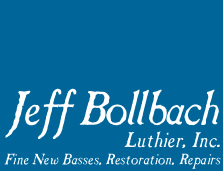|
|
|
|
|
|
LUTHIER
RANT
Fingerboards
| Bass Bars | Glues | Saddles
| Bridges
My Tuners | The
Sound Post | Regraduation
|
GLUES — crazy talk I tell ya' You might think that some of the basics of lutherie are pretty much standardized - like what glue to use to fasten two pieces of wood together. Not so. There are many hundreds, if not thousands of basses out there that have been maimed [many irreparably] through the criminal use of carpenter glue, epoxy, and last but not least - crazy glue. You heard righ - crazy glue! It might be referred to as a "cyanoacrylate adhesive," but it's crazy glue just the same. You also might think that I am referring to instruments fixed by janitors in schools, bass owners who tinker, or luthier "hobbyists". No. I am specifically targeting so called "professionals" who are not being watched and who use these adhesives for quick, easy, and DIRTY repairs in the interest of fast profit. I aim to end these practices. There is a use for these adhesives - but there is much opportunity for abuse. This text will detail the pros and cons of adhesives in lutherie. By the way, crazy glue is a brand name and I don't mean to malign that company - I am sure that glue can be very useful. Many woodworking companies sell a commercial brand of cyanoacrylate glue that is used by some luthiers. I'll just refer to it as either CA glue or maybe just "stupid glue". I know that things are just things. But yet, there are things that I love. Not the kind of love that you have for your family or country - but it's a kind of love nonetheless. Wood is one of my loves - I derive much pleasure working with it. I've also had a long love affair with hide glue [I know that sounds like - getta life, but what can I say?]. This glue is a fabulous tool, capable of miracles. There is wood furniture found in Egyptian tombs that have joints as strong as the day they were set. Hide glue. I have seen many fine early instruments with invisible center seams - perfection lasting for centuries. Also hide glue. All the fine work I have seen has employed hide glue. It does its job because it knows how to get molecular. Much has been written on how hide glue works. One of the most common misconceptions about hide glues is that they must thoroughly penetrate and impregnate the wood adjacent to the glue line in order to produce tendrils or hooks of glue that will mechanically attach the glue to the pores of the wood. This has been shown to be untrue in the case of hide glue. Electro-chemical attraction between the molecules of the glue and wood is actually the basis for strong glue bonds. This is known as specific adhesion and result in bonds stronger than the wood itself. The downside to this glue is that it yields poor results when the joinery is inadequate. Not a problem if you are willing to put in the time to practice good or better joinery. Now while a good luthier endeavors to glue well, it is also apparent that many joints may fail over the course of time. I'm not talking about the kind of time where you get paid-the bass goes out and five years later it opens. I mean fifty-seventy-five-a hundred or more years. One of the beauties of hide glue is that if a joint fails the glue can be easily cleaned out with warm water and you can start afresh. This is where the other glues fail. They contaminate an instrument and act as a cancer over time. Not a problem if you just want the paycheck and don't care what happens ten years down the road. Here's why they are a cancer. First of all, sometimes I'll refer the "body proper". By this I mean - in order of importance - the top plate, the back, the ribs, and the scroll. Other parts - the neck, fingerboard, interior blocks, bassbar are more or less extraneous. The loss of any of these parts does not really affect the intrinsic worth of the instrument. So while if you were to glue on a fingerboard with epoxy, while certainly not recommended, it would not affect the "body proper". It is when wrong adhesives are introduced to the top-ribs-back-scroll that the real damage is set in motion. I'll explain. page | 1 | 2 | |


| 359 Miller Avenue, Freeport, NY 11520 (516) 867 1395 · jbollbach17@gmail.com |